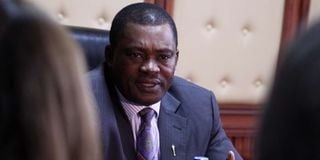Petitioner loses bid to remove Speaker Muturi

The Speaker of the National Assembly Justin Muturi.
What you need to know:
- Justice James Makau struck out the petition and ruled that the court lacked jurisdiction to deal with the case.
- The judge found that the matter raised by the petitioner is required to be dealt with at the Parliament first, before the aggrieved party seeks court’s intervention.
The High Court has thwarted an attempt to remove National Assembly Speaker Justin Muturi from office over claims that his re-election in 2017 was not in conformity with the law.
Dr Noah Migudo Winja, who was Mr Muturi’s competitor during the August 2017 election, wanted the court to declare Mr Muturi’s election null and void over claims that he was not properly cleared by the electoral commission before participating in the polls.
But Justice James Makau struck out the petition and ruled that the court lacked jurisdiction to deal with the case.
The judge found that the matter raised by the petitioner is required to be dealt with at the Parliament first, before the aggrieved party seeks court’s intervention.
“The petitioner did not invoke that procedure but opted to file this matter straight for determination, without exhausting that process. The petitioner ignored the proper forums without any justification,” said justice Makau.
He added that the actions that were subject of the petition were matters relating to the internal proceedings of the National Assembly, which Parliament is mandated to control.
Parliament ought to be allowed to regulate its own affairs without undue interference by the court or anyone, said justice Makau, adding that courts are required to show restraint to the independence of the legislature.
“The restraint is important when it comes to questioning parliamentary procedures as long as they do not breach the constitution or are not in excess of their mandate,” said the judge.
In the petition, Dr Winja wanted the court to order for his swearing in on grounds that he was the only candidate who was qualified for the said election having not withdrawn his candidature before August 31, 2017.
He claimed that Mr Muturi handed in the nomination papers late and failed to seek clearance from the electoral commission before the deadline of the submissions of all the documents which was on August 29 at 9am.
Mr Winja also claimed that Mr Muturi collected signatures from 210 MPs in support of his re-election instead of the prescribed 20, thereby locking out other contestants from obtaining the requisite number of signatures. MPs are required to only sign once.
Apart from urging court to declare Mr Muturi’s election invalid, the petitioner also wanted the Clerk of the National Assembly Michael Sialai be ordered to call for a repeat election and Mr Muturi be blocked from participating.
Mr Winja also wanted Mr Muturi declared unfit to occupy public office by reason of having used ‘unethical methods to deny others’ opportunity to collect signatures as he collected more than the prescribed.
He further said during the Speaker’s election there were only 221 members present instead of 233.
But justice Makau said a close perusal of the petition reveal that apart from citing provisions of the Constitution, the Petition does not provide particulars of the alleged complaints.
“The petitioner’s claim in so far as it relates to the violation of the Constitution is not sufficiently pleaded to assist this court in making determination on alleged violations,” said justice Makau.
He added: “In any constitutional matter, it is important for a party to outline precisely the particular provision of the Constitution that have been violated, indicating how or in what manner and by who.”
The court held that it is not enough for a party to allege a breach of the Constitution without providing particulars of the alleged breach.
Judge Makau said the petition was not qualified as a Constitutional petition nor was it raising any constitutional issues.





